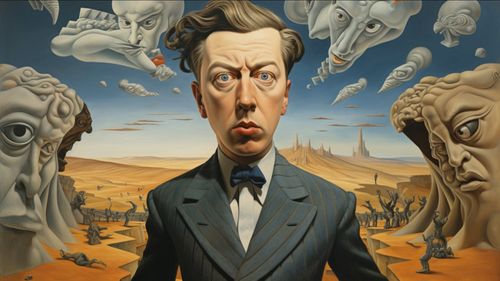The Surrealist Philosophy of André Breton: A Revolutionary View of Reality
Feb 01, 2024 · 2 mins read
0
Share

1. Allow me to introduce André Breton, the revolutionary mind behind Surrealism. Born in 1896, this French writer and poet sought to challenge the drudgery of everyday life, liberating creativity through the power of dreams and the subconscious.
Save
Share
2. Breton's Surrealism was born from the ashes of World War I, a response to a global 'crisis of consciousness'. It was a radical departure from the rational, embracing the absurd, the unconventional, and the shocking.
Save
Share
3. In his 1924 Surrealist Manifesto, Breton defined surrealism as "pure psychic automatism". This was a call to express the real functioning of thought, free from the control of reason and devoid of aesthetic or moral concerns.
Save
Share
4. Breton believed in the transformative power of dreams. He saw them as a gateway to a super-reality, a realm where the ordinary could become extraordinary, and the mundane could morph into the marvelous.
Save
Share
5. Breton's Surrealism wasn't just about art—it was a philosophical revolution. His second manifesto in 1930 delved into the philosophical implications of Surrealism, challenging established norms and values.
Save
Share
6. Despite breaking with the Communist Party in 1935, Breton remained committed to Marxist ideals. His work was a testament to his belief in the power of revolutionary thought to reshape society.
Save
Share
7. Breton's Surrealism was not confined to the written word. He embraced various creative media, from collage to printmaking, creating poetic word-image combinations that reflected his inner mind.
Save
Share
8. Breton's influence extended beyond France. During World War II, he escaped to the United States, where he continued to promote Surrealism, organizing exhibitions and issuing manifestos.
Save
Share
9. Breton's legacy lives on. His revolutionary approach to art and philosophy continues to inspire artists and thinkers, challenging us to see the world through a different lens.
Save
Share
10. In the end, André Breton taught us that reality is not just what we see—it's also what we dream. His Surrealism invites us to explore the depths of our subconscious, to find beauty in the absurd, and to reimagine the world around us.
Save
Share
0